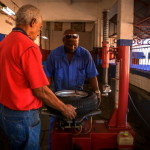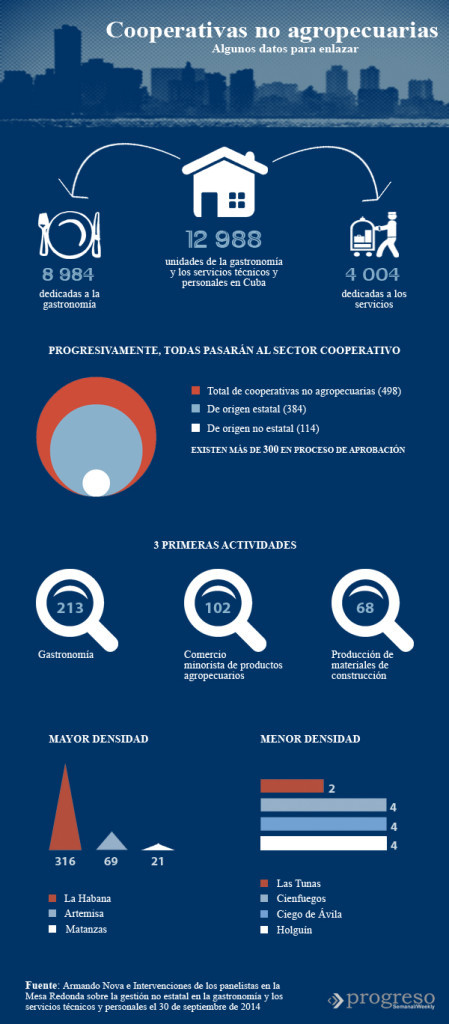
Urban cooperatives in Cuba: A little, not too much
HAVANA — Luis used to tour the Las Cañas neighborhood, in the Cerro district, leading a cart pulled by a goat. The local kids would pay him 1 peso for a three- or four-block ride. He was 14 and looked after his mother.
“I’ll never do that again in my lifetime,” says today the young owner of a prosperous technical services store in Centro Habana. No doubt about it, he always managed to make a living.
A self-employed entrepreneur, he has reached the top as a “cuentapropista” in Cuba and, “to evolve,” plans to form a cooperative with his closest associates.
“This way, our opportunities are greater than as private-sector workers,” he says. “I can compete on equal terms with state-run businesses and find a solution to the problem of supplies, which cannot always be found by legal means.”
Until 2010, only farm cooperatives were permitted in socialist Cuba. That year, Law Decree 305 defined the operating rules for the new Non-Agricultural Cooperatives (CNAs).
Today, 341 CNAs have registered with the National Office of Tax Administration (ONAT). Many of them emerged from farmers’ markets and deal with a few sectors, such as certain types of public transportation, collection of raw materials, and some food services. The current legislation calls them experimental.
One of the hazy aspects of this kind of economic association is the way in which they are disassociated from their parents, the farm cooperatives (many hope for a single law on cooperatives), yet they have maintained a high degree of centralization since their birth.
“The fact that it is the Council of Ministers that approves the creation of a cooperative adds complexity and distracts that institution,” says economist Armando Nova. “That task should be in the hands of the local organizations of the People’s Power, which should convey the necessary information to higher organizations.”
Before a cooperative is approved, a feasibility study is made, not by the Council of Ministers but by the Permanent Commission on Implementation and Development. As attorney Jorge Luis González Castro puts it, “this feasibility concerns not only its economic sustainability but also the political convenience of its creation.”
That refers mainly to the cooperatives that are formed by an agreement of individuals, not to those that are created by sites and services that used to be part of the state sector. The latter have had a different experience.
Duties and rights
“Volunteerism is not accomplished when the State decides to undertake the formation of cooperatives and does not consult with the workers,” Nova continues. “Once the cooperative has been approved, the State turns to them and informs them. And that shouldn’t be.”
“From the start, they’re violating the principle of volunteerism, which cannot be considered a posteriori but a priori. That keeps the members from feeling that they’re collective owners from the very beginning.”
Another deficiency analyzed is the prolonged absence of a rule for any challenges to the licensing processes and to the regulations of second-level cooperatives.
The task of drafting the first document was given to the Council of Ministers, within 30 days after the publication of Law Decree 305 in the Official Gazette, Dec. 11, 2012, and the drafting of the second document to the Council of Government of the People’s Supreme Court, within one year. But the rule on challenges remains unwritten.
The licensing of public services is a process that both the institutions and the self-employed workers must tackle. In this case, the principal gap is in the publicity of the information, which is a right to the interested parties as well as a duty in the pursuit of transparency and equality. The communications media need to serve as buttresses and facilitators of these practices.
Employees or members?
The hiring of the labor force by the CNAs is another hot issue for the members. Their contracts have a three-month limit, as opposed to the farm cooperatives, which hire paid workers for an indefinite time. The three-month limit is insufficient for many of the jobs the cooperative might need, jobs that some of their members many not be able to take on.
According to González Castro, “the mechanisms to control the incorporation of the labor force and prevent Cuban cooperativism from sliding into private enterprise should have been of a tax nature, so as to discourage any possible deviations of the process.”
There is also a contradiction in the CNAs’ legal-labor relationship because, according to the new Labor Code, a member of a cooperative is not considered a salaried worker, even when the cooperatives ask their members to participate in the work. This duality (cooperativist/salaried worker), if misunderstood, could leave the worker without protection.
It is on this point that the role of the labor unions is not clear, “because they are not effective if they cannot represent the member in his condition as an unrecognized worker (even in his own condition as a legal person), nor can they recognize the salaried worker in a cooperative because of the ephemeral nature of their legal and labor relationship, all of which would be corrected if the indefinite existence of the hired worker were taken into account,” the lawyer says.
Vested interests
This is a very big change, Nova admits. “In the past, everybody waited for orders but that’s no longer the case. The rules change. Are we prepared to accept new rules?” Going from being a salaried worker for the State to being active in self-supported economic relations requires accommodations that are not only material but also subjective.
On the other hand, “there is an impressive bureaucratic structure, created more than 50 years ago, that has its own interests and may not be willing to renounce them.”
The cooperatives are also a space of confrontation between the new, which wants to grow, and the old, which refuses to die. A struggle in which others, like Luis, who wants to go from individual worker to cooperativist, are placing their expectations.
“The way I see it, if those mechanisms don’t work, I’m going to be disappointed and leave the country. I know that this new model not always works the way it should. I know about seven cooperatives, and in reality all of them have a single owner.
“But I like Cuba and, yes, I do want to participate in the change, that’s why I’m here. In my barrio they say that some are born to fly and others to crash. So, we’ll see if we end up in the sky or on the floor.”
Photos: Kako
Progreso Semanal/ Weekly authorizes the total or partial reproduction of the articles by our journalists, so long as source and author are identified.









